So there's a debate in Taiwan about whether or not Samsung threatened to "kill" Taiwan by taking over some industries there.
Here's
another reason I will never have a leadership position in Taiwan.
Instead of debating about whether or not Samsung had such a plan, I
would visit South Korea on a fact-finding mission. I would then announce
that I was going to apply South Korea's various restrictions on
business on Samsung:
* Force Korean businesses operating in Taiwan to shut down their businesses at least twice a month.
* Restrict large Korean companies from expanding into other industries.
* Prevent Korean companies in Taiwan from open in randomly designated areas (such as, within 500 feet of mom and pop stores)
* Force large Korean companies in Taiwan to share their profits with smaller companies.
* Demand that they increase their CSR giving.
* Even monitor and control such things as the temperature in their buildings.
* Threaten to tax them more to pay for numerous social programs.
Well, actually, I wouldn't do such stupid things, proof that I am not a politician in South Korea.
To paraphrase Mark Twain:
Suppose you were an idiot.Of course, that isn't true. I'm just talking about the ones intervening in the economy.
Suppose you were a politician in Korea.
But I repeat myself.
 |
| My local Lotte Mysuper. Forced to close because of the government's (national, local, regional) idiotic "economic democratization" campaign. |
 |
| One night, I stopped by to go shopping, then, oh, Snap! The door was locked. Thanks, Korean government! |
 |
| The Korean government's effort to slow economic growth. |
 |
| I asked an employee if I could have the sign the day after. I'm sure if she knew how much I am opposed to the policy that she would have given it to me. |
 |
| I guess she didn't get the memo that the store was closed, per the government's orders. |
 |
| Definitely, she didn't get the memo. She walked even closer to the sign, then stomped her foot. I wonder if she voted for the politicians who supported the policy. |
 | |
| If I were CEO of E-mart, the banner would have a photo of the politician responsible for the closure, thanking him for his vision for helping the economy. |